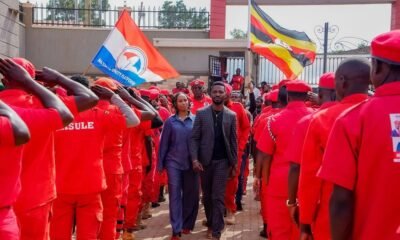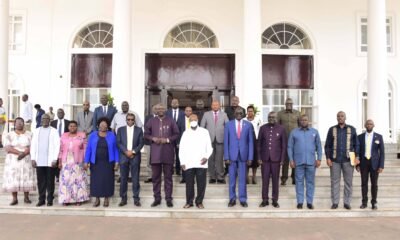Politics
H.E. President Museveni’s Statement on NRM’s Ideological and Strategic Vision
In a recent address to the nation, President Yoweri K. Museveni, the leader of the NRM, discussed the party’s ongoing efforts to strengthen its organizational structure and reaffirm its ideological and strategic foundations.

In a recent address to the nation, President Yoweri K. Museveni, the leader of the National Resistance Movement (NRM), discussed the party’s ongoing efforts to strengthen its organizational structure and reaffirm its ideological and strategic foundations. Speaking to fellow Ugandans and the “Bazzukulu” (grandchildren), the President highlighted the success of a nationwide exercise launched on May 6, 2025, to audit and update the NRM membership register. This initiative began with village conferences and culminated in two significant conferences held at Kololo, often referred to by Ugandans as “Namboole” due to its historical associations with past events held at the Namboole Stadium.
The membership audit, a massive undertaking, revealed the NRM’s enduring strength, with over 20 million registered members across the country, of whom 18.5 million are of voting age (18 years and older). In his home village of Rwakyitura, for instance, the President noted that the original register listed 350 members. However, after accounting for migrations, deaths, and other factors, the verified number stood at approximately 251. He emphasized that this exercise was a testament to the NRM’s commitment to grassroots engagement and organizational rigor.
President Museveni reiterated the NRM’s core ideology, which is anchored in four fundamental principles: patriotism (love for Uganda), Pan-Africanism (love for Africa), socio-economic transformation, and democracy. He explained that these principles prioritize the collective interests of Ugandans and Africans over divisive identities based on tribe or religion. “Why love Uganda, why love Africa, and why not only love your tribe or religious sect? Because you need them for your prosperity and strategic security, as well as for market and defense potential,” he stated. He added that the NRM’s politics is driven by interests rather than identity, welcoming anyone who subscribes to these values to join the movement.
A key issue raised during the National Executive Committee (NEC) conference was the debate over the status of old versus new NRM members, a topic brought up by Rt. Hon. Rebecca Kadaga. The President firmly rejected any notion of prioritizing longevity of membership, citing both practical and ideological reasons. He recalled addressing this issue years ago, noting that legal checks confirmed that no minimum time requirement exists for members to qualify for party positions. Even if such a guideline were to exist, he argued, it would be misguided.
To illustrate his point, President Museveni drew on the biblical parable of the laborers in the vineyard (Matthew 20:1-16), where workers hired at different times of the day received equal wages. He likened the NRM to the vineyard owner, emphasizing that all members, whether long-standing or new, should be treated equally. “In the Kingdom of God, there are no young or old,” he quoted, underscoring that political parties must avoid creating hierarchies based on tenure. He warned that discriminating against or resenting new members could alienate potential allies, citing the Democratic Party’s (DP) missteps in 1980 as a cautionary tale. The DP’s failure to fully embrace new supporters, including former members of Kabaka Yekka and other factions, contributed to its political setbacks.
President Museveni also shared his own political journey to highlight the importance of inclusivity. A former DP member from 1960 to 1970, he joined the Uganda Peoples Congress (UPC) in 1970, distributing UPC cards in a DP stronghold. Despite his activism—mobilizing communities to abandon nomadism, founding the University Students African Revolutionary Front (USARF), and leading a student delegation to Mozambique’s liberated zones in 1968—the UPC failed to fully harness his contributions. This missed opportunity, he argued, underscores the need for political parties to recognize and integrate new talent without prejudice.
Drawing another biblical analogy, the President referenced St. Paul, a former persecutor of Christians who became a leading apostle after his conversion. Similarly, new NRM members, regardless of their past affiliations, should be embraced as equals, as they could bring significant value to the party’s mission.
President Museveni urged NRM members to focus on solving the people’s problems through government programs like the Parish Development Model (PDM) and Emyooga, rather than engaging in internal rivalries. He warned that discriminating against newcomers could undermine the party’s strength and alienate supporters, potentially repeating the mistakes of past political movements. “In political parties, all members should be equal,” he emphasized, advocating for a unified approach to advance the NRM’s goals.
The President concluded by promising to address organizational issues, including the challenge of corruption, in a future address. For now, his message was clear: the NRM’s strength lies in its inclusivity, ideological clarity, and commitment to the prosperity and security of its members.
Politics
Lessons from America’s Political Division: A Warning for Uganda
Central to America’s division is the mainstream media, which wields immense influence but often prioritizes narrative over neutrality.

In an era of deepening global interconnectedness, nations like Uganda can draw critical insights from the political turmoil unfolding in the United States. The U.S., once hailed as a beacon of democracy, is now gripped by extreme partisan division that threatens its social fabric and governance. This division manifests in a vicious cycle: one party loses power, incites unrest, implements polarizing policies upon regaining it, and repeats the process. As Ugandans, we must heed these warnings to avoid similar pitfalls, particularly the role of biased media in fueling conflict. By examining the U.S. experience, we can prioritize national unity over unchecked individualism, ensuring media accountability and responsible discourse for the greater good.
The U.S. political landscape operates in a repetitive loop driven by partisan animosity. When Democrats (often aligned with left-leaning ideologies) lose elections, they have historically mobilized protests and legal challenges that escalate into riots or widespread unrest. For instance, following Donald Trump’s 2016 victory, opposition framed as “resistance” included mass demonstrations and accusations of illegitimacy. When Republicans regain power; as with Trump’s return in 2024, they confront these tactics head-on, implementing reforms that provoke further backlash. Democrats then regain office, enact policies perceived as radical (such as expansive social programs or lax immigration enforcement), leading to public disillusionment and economic strain. Inflation surges, crime rates climb in certain areas, and cultural shifts alienate moderates, paving the way for Republican resurgence. This pattern has intensified over decades, eroding trust in institutions and fostering a zero-sum mentality where compromise is rare.
A key driver of this cycle is affective polarization, where Americans increasingly view the opposing party not just as wrong, but as morally corrupt or dangerous. Causes include generational shifts, with younger voters leaning left on social issues while older ones prioritize economic conservatism; geographic sorting, where liberals cluster in urban areas and conservatives in rural ones; and the rise of identity politics, amplifying divisions along racial, cultural, and class lines. The effects are profound: legislative gridlock, as seen in repeated government shutdowns; eroded democratic norms, with events like the January 6, 2021, Capitol riot highlighting how rhetoric can spill into violence; and a public health toll, including increased stress and social isolation.
Central to America’s division is the mainstream media, which wields immense influence but often prioritizes narrative over neutrality. Studies from UCLA indicate that a significant portion estimated at around 80-90% based on analyses of major outlets leans left, with 18 out of 20 prominent sources scoring liberal in bias assessments. Networks like CNN and MSNBC exemplify this, contributing to what many perceive as a coordinated assault on conservative figures, particularly Donald Trump. This bias didn’t emerge overnight; it stems from a historical shift where journalists increasingly identify as Democrats, leading to skewed coverage that demonizes opponents.
The origins trace back to Trump’s 2016 campaign, when his outsider status and blunt rhetoric clashed with media elites. Coverage of Trump has been overwhelmingly negative; about 92% in his first 100 days of the second term, according to media watchdogs like the Media Research Center focusing on scandals while downplaying achievements. Examples abound: Trump’s “Muslim ban” was labeled xenophobic, yet similar travel restrictions under prior administrations went unchallenged. This selective outrage extends to policy critiques, where media outlets amplify progressive voices while marginalizing conservative ones, creating echo chambers that radicalize audiences.
Immigration policy vividly illustrates media double standards. Previous presidents, including Bill Clinton (who deported over 12 million), George W. Bush (nearly 2 million formal removals), and Barack Obama (over 3 million, earning the moniker “Deporter-in-Chief”), enforced strict border measures without widespread media condemnation. CNN even embedded reporters in ICE raids under Obama, portraying them positively as necessary enforcement, with a 2016 segment granting “exclusive access” to operations in Chicago.
Contrast this with Trump: His deportation efforts, though fewer than Obama’s (around 2 million), were vilified as cruel and racist. Under Biden, policies like expanded parole programs and reduced interior enforcement led to a surge, with unauthorized immigrants reaching a record 14 million by 2023 and over 8 million encounters at the border. This influx strained resources, contributing to crime spikes in some cities and public backlash that helped Trump’s 2024 reelection on a deportation platform. Yet, media outlets and Democrats framed Trump’s plans as “mass deportations” inciting violence, stoking protests and state-level resistance (e.g., sanctuary cities refusing ICE cooperation). When confrontations occur such as arrests turning violent, the blame shifts to Republicans, fueling more unrest and electoral shifts.
This propaganda tactic follows a pattern: Lose elections, amplify outrage through media, incite resistance, blame opponents for fallout, regain power, implement unpopular policies (e.g., “woke” ideologies or unchecked migration), alienate the populace, and lose again. The result? Deepened division, with families fractured and communities polarized.
Uganda, with its own history of political transitions and media influence, must learn from America’s mistakes to foster sustainable development. Media is a vital communication tool but can become a society’s worst enemy when it peddles bias over facts. To prevent division, Uganda should enforce stricter regulations: Revoke licenses for outlets spreading negative propaganda, as unchecked narratives erode trust. Social media moderation is essential, holding users accountable for speech that incites violence or insurrection echoing global calls to curb misinformation without stifling debate.
For societal harmony, individual freedoms must sometimes yield to collective well-being. Criticizing government is healthy, but it should include constructive solutions, not mere provocation. By limiting divisive rhetoric and promoting balanced reporting, Uganda can avoid the U.S.’s fate, building a cohesive nation focused on progress rather than perpetual conflict.
Blog
Why NUP’s 2026 Campaign Failed to Resonate with the Ugandan Electorate (Summary)
Central to NUP’s struggles was an increasingly rigid internal culture, which many observers characterized as hostile to criticism.
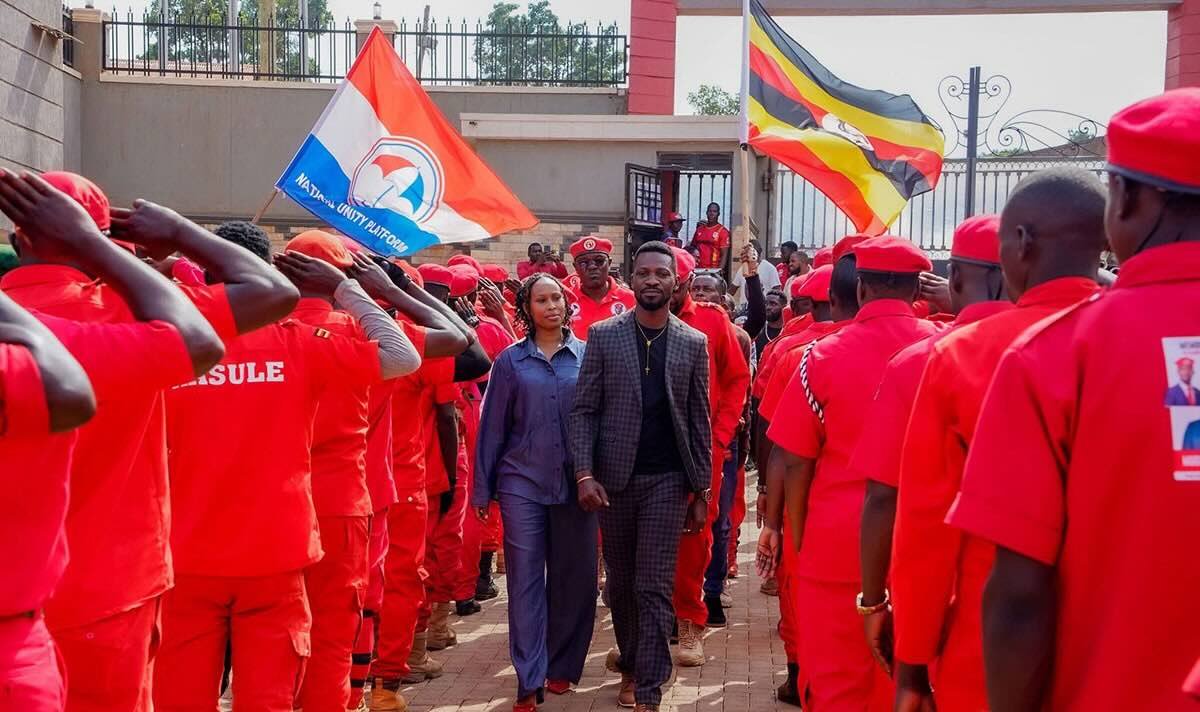
The 2026 general elections in Uganda marked a significant turning point for the National Unity Platform (NUP), transitioning from a remarkable rise to a noticeable political decline. While there remains a strong desire for reform among many Ugandans, NUP failed to harness that energy due to several strategic miscalculations and a fundamental disconnect from the realities faced by the majority of the population. This summary explores the institutional and tactical failures that contributed to the party’s diminished influence in the current political landscape.
Central to NUP’s struggles was an increasingly rigid internal culture, which many observers characterized as hostile to criticism. By adopting an “all-or-nothing” approach, the party leadership often isolated potential allies and marginalized moderate voices within the opposition. This ideological intolerance fostered an environment where any deviation from party lines was viewed as a betrayal, ultimately hindering the formation of broad coalitions necessary to challenge a well-entrenched incumbent. Rather than building an inclusive movement, the party retreated into an echo chamber that valued loyalty over strategic growth.
Additionally, the party faced a significant “vision gap” that alienated pragmatic voters. While the “People Power” movement and the “New Uganda” brand effectively mobilized urban youth through emotive rhetoric and slogans like “Uganda is bleeding,” they struggled to provide a clear governance roadmap. Throughout the 2026 election cycle, NUP was unable to move beyond the language of protest. To the middle class and rural agricultural communities, the party appeared to lack a credible manifesto on issues such as debt management, infrastructure, food security, and digital transformation. This absence of a coherent governing philosophy left a void that voters filled with skepticism, opting for the predictability of the status quo over the uncertainty of undefined change.
The decline was further evidenced by the quality of candidates NUP fielded for parliamentary seats. The 2026 results revealed a significant decrease in the party’s legislative footprint, which resulted from prioritizing social media popularity over professional competence in candidate selection. Many of the MPs elected in previous cycles were perceived as ineffective, lacking the legislative skill to influence policy or provide a serious alternative to the NRM’s parliamentary caucus. This perceived incompetence led many Ugandans to conclude that NUP was not yet prepared for the complexities of governance.
Externally, the party’s reliance on international validation proved to be a tactical error. By continuously appealing to Western organizations like the UN and EU, as well as figures like Donald Trump and Marco Rubio, to intervene and remove the newly elected President, NUP inadvertently conveyed a sense of domestic weakness. Many Ugandans viewed this internationalist strategy with suspicion, interpreting it as an invitation for foreign interference in sovereign affairs. This allowed their opponents to successfully frame the party as a vessel for external interests rather than a homegrown movement rooted in Uganda.
Ultimately, the 2026 elections demonstrated that catchy slogans and a strong digital presence cannot replace institutional depth. NUP lacked the grassroots organizational structure necessary to protect the vote and manage a national campaign. By prioritizing “facts over feelings,” the Ugandan electorate sent a clear message: the majority do not align with a movement that lacks a clear roadmap and refuses to engage with constructive dissent. Without a radical shift towards professionalization and intellectual humility, the party’s performance in 2026 may be remembered as the moment the movement lost its way.
Politics
President Museveni Urges Peaceful Dialogue at IPOD Summit Ahead of 2026 Elections
President Museveni called for peaceful dialogue ahead of 2026 elections at the IPOD Summit on September 18, 2025. Hon. Norbert Mao took over as IPOD chair, pledging a peaceful electoral process.

On September 18, 2025, President Yoweri Kaguta Museveni called for peaceful dialogue and unity among Uganda’s political leaders as the nation gears up for the 2026 general elections. Speaking at the Inter-Party Organisation for Dialogue (IPOD) Summit at Kololo Ceremonial Grounds, Museveni emphasized the need to reject violence and divisive politics to ensure Uganda’s continued progress.
The summit, themed “Together for a Peaceful and Sustainable Uganda,” convened leaders from six political parties: the National Resistance Movement (NRM), Democratic Party (DP), Uganda People’s Congress (UPC), Forum for Democratic Change (FDC), Justice Forum (JEEMA), and the People’s Progressive Party (PPP). The event marked a pivotal moment for fostering unity and consensus ahead of the elections.
In his keynote address, President Museveni, who also serves as NRM National Chairman and outgoing IPOD Summit Chair, urged opposition leaders to embrace peaceful engagement. “As we have seen in the last 40 years, the NRM has revived Uganda’s economy. Even if one has a wrong understanding, as long as they are not violent, the country will remain stable, and mistakes can be corrected,” he said. He warned that misdiagnosing societal issues and resorting to violence leads to chaos, citing examples from other African nations.
Drawing from his 65 years in politics, Museveni likened political leadership to medicine, stressing the importance of accurately diagnosing societal challenges. “If leaders misdiagnose societal issues, their countries collapse,” he cautioned, reiterating NRM’s core principles of patriotism, Pan-Africanism, socio-economic transformation, and democracy as the foundation for Uganda’s future.
Addressing concerns raised by UPC President Jimmy Akena about the recent teachers’ strike, Museveni underscored the need to prioritize limited resources. He cited the example of Soroti Flying School, where prioritizing pilots and engineers over other staff prevented its collapse. “Freedom fighters always prioritize,” he noted.
A significant highlight of the summit was the peaceful handover of IPOD chairmanship from President Museveni to DP President General, Hon. Norbert Mao. “Thank you for trusting NRM with the leadership for the last five years. I now peacefully hand over,” Museveni said.
Hon. Mao, in his acceptance speech, committed to fostering consensus and ensuring a peaceful 2026 election. “We shall leave the door of IPOD open. Our agenda is to ensure a peaceful, free, and fair election process while addressing Uganda’s challenges honestly,” he said. Mao commended Museveni for releasing nearly 70 political detainees earlier this year, describing the gesture as a significant step toward reconciliation.
NRM Secretary General, Rt. Hon. Richard Todwong, praised Museveni for sustaining IPOD after international donors withdrew funding. “You have shown that homegrown solutions can address African challenges,” Todwong said, urging political parties to promote unity and democratic values.
UPC President Jimmy Akena reaffirmed his party’s commitment to dialogue, stating, “We may not agree on every policy, but we must focus on the greater good.” FDC President Patrick Oboi Amuriat called for meaningful dialogue and urged Museveni to pardon political prisoners to foster national reconciliation. “Progress requires leaving the past behind,” he said.
JEEMA President Asuman Basalirwa echoed the need for consensus, while PPP President Saddam Gayira highlighted the success of non-confrontational politics. “In 30 years, none of our members have been arrested because we preach peaceful engagement,” Gayira noted.
IPOD Executive Director Dr. Lawrence Sserwambala warned of challenges such as electoral violence and youth vulnerability, urging leaders to nurture young people as champions of peace. “The 2026 elections provide a critical opportunity to strengthen consensus, fairness, and inclusivity,” he said.
The summit saw attendance from key figures, including Speaker of Parliament Rt. Hon. Anita Among, Electoral Commission Chairperson Justice Simon Byabakama, and NRM’s Central Executive Committee members, signaling strong support for dialogue as a tool for democratic progress.
As Uganda approaches the 2026 elections, the IPOD Summit underscored the importance of unity, peaceful engagement, and consensus-building to secure a stable and prosperous future for the nation. “History will judge us by the choices we make. Let us choose peace and put Uganda first,” Dr. Sserwambala concluded.
-

 Entertainment11 months ago
Entertainment11 months agoMuseveni’s 2025 Copyright for Musicians breakdown
-
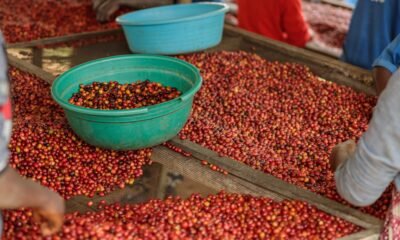
 Business11 months ago
Business11 months agoUganda’s Ministry of Finance projects significant growth opportunities in 2025
-
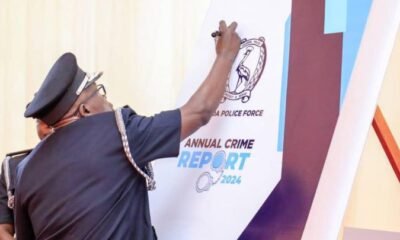
 Policies11 months ago
Policies11 months agoBreakdown of the Uganda Police Force Annual Crime Report 2024
-

 Policies11 months ago
Policies11 months agoIs Uganda’s Shs10m Fine the WORST Thing for Cohabiting Couples?
-

 Sports10 months ago
Sports10 months agoThe Transformative Impact of World Cup Qualification for Uganda
-

 Health11 months ago
Health11 months agoBreaking down the Malaria Vaccine Rollout in Uganda
-

 Business11 months ago
Business11 months agoThe 9 worst mistakes you can ever make at work
-

 Entertainment11 months ago
Entertainment11 months agoIsaiah Misanvu Teams Up with Nil Empire for a Soul-Stirring Anthem of Gratitude and Transformation “Far Away”


